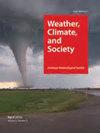Flash drought typologies and societal impacts: a worldwide review of occurrence, nomenclature, and experiences of local populations
IF 1.9
4区 地球科学
Q3 ENVIRONMENTAL STUDIES
引用次数: 0
Abstract
Abstract Flash droughts, characterised by rapid onset and intensification, are increasingly occurring as a consequence of climate change and rising temperatures. However, existing hydrometeorological definitions fail to encompass the full range of flash droughts, many of which have distinct local physical attributes. Consequently, these events often go undetected or unforecast in generic global flash drought assessments and are underrepresented in research. To address this gap, we conducted a comprehensive survey to gather information on local nomenclature, characteristics, and impacts of flash droughts worldwide. The survey revealed the widespread occurrence of these phenomena, highlighting their under-researched nature. By analysing case studies, through literature review often in local languages to unearth elusive studies, we identified five different types of flash droughts based on their specific characteristics. Our study aims to increase awareness about the complexity and diverse impacts of flash droughts, emphasising the importance of considering regional contexts and the vulnerability of affected populations. The reported impacts underscore the need for better integration of all flash drought types in drought research, monitoring, and management. Monitoring a combination of indicators is crucial for timely detection and response to this emerging and escalating threat.突发性干旱的类型和社会影响:全球范围内对发生、命名和当地人口经验的回顾
由于气候变化和气温上升,突发性干旱以快速发生和加剧为特征,越来越多地发生。然而,现有的水文气象定义未能涵盖突发性干旱的全部范围,其中许多具有独特的当地物理属性。因此,在一般的全球突发性干旱评估中,这些事件往往未被发现或无法预测,在研究中也代表性不足。为了弥补这一差距,我们进行了一项全面的调查,以收集有关全球突发性干旱的当地术语、特征和影响的信息。这项调查揭示了这些现象的普遍存在,突出了它们的研究不足的性质。通过对案例研究的分析,通过对当地语言的文献回顾来挖掘难以捉摸的研究,我们根据其具体特征确定了五种不同类型的突发性干旱。我们的研究旨在提高人们对突发性干旱的复杂性和多样性影响的认识,强调考虑区域背景和受影响人群脆弱性的重要性。报告的影响强调需要在干旱研究、监测和管理中更好地整合所有突发性干旱类型。监测综合指标对于及时发现和应对这一新出现和不断升级的威胁至关重要。
本文章由计算机程序翻译,如有差异,请以英文原文为准。
求助全文
约1分钟内获得全文
求助全文
来源期刊

Weather Climate and Society
METEOROLOGY & ATMOSPHERIC SCIENCES-
CiteScore
3.40
自引率
13.60%
发文量
95
审稿时长
>12 weeks
期刊介绍:
Weather, Climate, and Society (WCAS) publishes research that encompasses economics, policy analysis, political science, history, and institutional, social, and behavioral scholarship relating to weather and climate, including climate change. Contributions must include original social science research, evidence-based analysis, and relevance to the interactions of weather and climate with society.
 求助内容:
求助内容: 应助结果提醒方式:
应助结果提醒方式:


